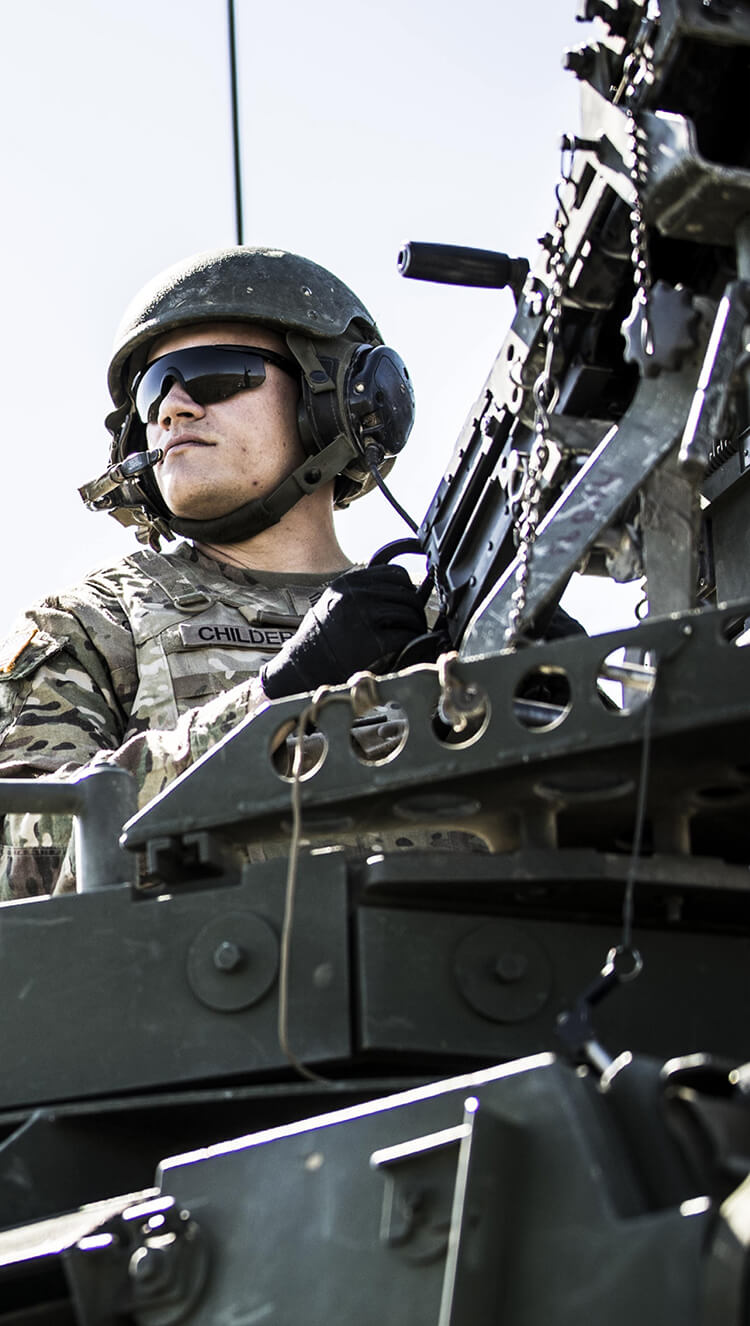
EARN UP TO $50K OVER TIME
With a variety of enlistment bonuses, you can start earning extra money on top of your salary during your first service term.
Bonuses Immediately Available to You
New recruits can combine several bonuses for an enlistment package of up to $50,000. You can earn this extra money for reporting to Basic Training quickly, having in-demand skills or following certain career paths.
-
up to $50k
Active Army Enlistment Bonus
Additional money for full-time recruits
-
up to $15k
Quick Ship Bonus
Get fast money when you report to Basic Training right away
-
up to $47.5K
Job Signing Bonus
Bonuses for filling in-demand jobs
-
up to $20k
Army Reserve Enlistment Bonus
More money for part-time service
-
up to $45k
Civilian Acquired Skills Bonus
Money for skills the Army needs
Many Ways to Earn. Many Ways to Serve.
Talk to your local recruiter to get the full details on how you could earn up to $50k in bonuses.
Thanks for reaching out,
Questions you may have right now
- Who will reach out to me?
One of our recruiters will either call or email you to set up time to talk.
- Who will reach out to me?
One of our ROTC recruiters will either call or email you to set up time to talk.
- What will you ask me?
Our conversation will likely begin with some basic qualifying questions, like your age and education level. From there, the conversation will be about getting to know you and your goals for the future. Expect us to ask about your interests and skills so we can suggest Army jobs that might interest you.
- How can I prepare for the conversation?
-
While we'll ask you questions, this is your opportunity to ask some of your own. Here are a couple to get you started:
How can the Army help me pay for college?
Do I have to go to Basic Training?
- How can I prepare for the conversation?
-
While we'll ask you questions, this is your opportunity to ask some of your own. Here are a couple to get you started:
How can the Army help me pay for college?
What is the time commitment for part-time service?
- How can I prepare for the conversation?
-
While we'll ask you questions, this is your opportunity to ask some of your own. Here are a couple to get you started:
Can the Army help me pay for medical school?
Do I have to go to Basic Training?
- How can I prepare for the conversation?
-
While we'll ask you questions, this is your opportunity to ask some of your own. Here are a couple to get you started:
How do I apply for ROTC scholarships?
How do I join ROTC at the college I want to attend?
- Will I be expected to join if I talk to someone?
No. Our goal is to answer your questions and help you decide if the Army is a good option for you. We understand you may not be ready to join yet, or that we may not be the right fit, and that's fine. There's no obligation for talking to us.
KEEP EXPLORING
Explore more topics that may interest you
Thanks for reaching out,
Questions you may have right now
- Who will reach out to me?
One of our recruiters will either call or email you to set up time to talk.
- What will you ask me?
Our conversation will likely begin with some basic qualifying questions, like your age and education level. From there, the conversation will be about getting to know you and your goals for the future. Expect us to ask about your interests and skills so we can suggest Army jobs that might interest you.
- How can I prepare for the conversation?
-
While we'll ask you questions, this is your opportunity to ask some of your own. Here are a couple to get you started:
Do I qualify to join the Army?
Can I join as an Officer?
- How can I prepare for the conversation?
-
While we'll ask you questions, this is your opportunity to ask some of your own. Here are a couple to get you started:
Do I qualify to join the Army?
Can I join as an Officer?
- How can I prepare for the conversation?
-
While we'll ask you questions, this is your opportunity to ask some of your own. Here are a couple to get you started:
What type of health care jobs are available in the Army?
Can the Army help me pay for medical school?
- How can I prepare for the conversation?
-
While we'll ask you questions, this is your opportunity to ask some of your own. Here are a couple to get you started:
Can I join ROTC at my age
Can I join as an Officer?
- Will I be expected to join if I talk to someone?
No. Our goal is to answer your questions and help you decide if the Army is a good option for you. We understand you may not be ready to join yet, or that we may not be the right fit, and that's fine. There's no obligation for talking to us.
KEEP EXPLORING
Explore more topics that may interest you
Thanks for reaching out, .
We admire you for considering such a big career decision at your age. Unfortunately, we're unable to directly reach out to you until you are at least sixteen years old and a junior in high school. However, the following ROTC info is something that may interest you now.
Questions you may have right now
- How old do I have to be to serve in the Army full-time?
To become an enlisted Soldier, you must be 17 years old. To become an Army Officer, you must be at least 18 years old and have a college degree obtained either through ROTC, U.S. Military Academy at West Point, or from another college or university program. Learn more about Army Eligibility Requirements and how to receive Officer training while in college.
- How can the Army help me pay for college?
There are a variety of options available to help you pursue education with flexibility, such as ROTC programs, the GI Bill, and other programs that help pay for college tuition, trade school, technical school, or trainings. View all of the Education Benefits available to you
- How do I apply for ROTC Scholarships?
Army ROTC has several scholarships available for college-bound high school students. Review your options at ROTC Scholarships, or immediately apply by creating an account at my.goarmy.com to get started.
- How old do I have to be to serve in the Army part-time?
To become an enlisted Soldier, you must be 17 years old. To become an Army Officer, you must be at least 18 years old and have a college degree obtained either through ROTC, U.S. Military Academy at West Point, or from another college or university program. Learn more about Army Eligibility Requirements and how to receive Officer training while in college.
- What are the ways to serve part-time?
You can serve part-time as a Soldier in the Army Reserve or the Army National Guard. By serving part-time, you are able to continue your college education or work a civilian job, while earning an extra paycheck and maintaining many of the benefits of military service.
- How can the Army help me pay for college?
There are a variety of options available to help you pursue education with flexibility, such as ROTC programs, the GI Bill, and other programs that help pay for college tuition, trade school, technical school, or trainings. View all of the Education Benefits available to you.
- How do I become a health care provider in the Army?
You can serve part-time or full-time as you train in our health care program. Upon graduation of the program, you will enter the Army health care team as a Commissioned Officer.
- What types of medical careers are available in the Army?
There are numerous health care careers available through the Army Medical Education Deparment (AMEDD), including physicians, dentists, nurses, veterinarians, and many more. View your career options.
- How can the Army help me pay for college?
There are a variety of options available to help you pursue education with flexibility, such as ROTC programs, the GI Bill, and other programs that help pay for college tuition, trade school, technical school, or trainings. View all of the Education Benefits available to you.
- What are the benefits of joining ROTC?
ROTC makes it possible to achieve your ambitions. Become a leader and serve your country in one of the nation's top leadership training programs. You can do this while maintaining your college curriculum and earning up to 100% tuition coverage. Upon graduation, you're guaranteed a career as an Army Officer.
- How do I prepare to join ROTC?
When you're at least 16 years old and at least a high school junior, you can reach out to us, or even talk to your high school counselor. Together, we'll talk options and decide if ROTC is the right path for you.
- Will I become an Officer if I complete ROTC?
Yes. After graduation, you are commissioned as a highly respected second lieutenant in the Army, entrusted with leading other Soldiers.
KEEP EXPLORING
Explore more topics that may interest you
Ready to get Rewarded?
Explore exciting jobs with a signing bonus available.
When I first joined the Army Reserve and there was a Geospatial Engineer slot open, the benefits that came along with the signing bonus were a great opportunity and I didn't want to pass that up.- Pfc. Taylor Barisoff, U.S. Army Reserve

Common Questions
-
How are Army bonuses paid out?
-
The timing of your bonus and how it’s paid out will depend on which ones you qualify for and the details of your contract. Generally, initial payments for new enlistment bonuses are made after the completion of your training, but timing may vary. It’s important to work with your recruiter and get all the details of the bonuses you’re eligible for and how to receive payment during your joining process.
-
Do bonuses depend on your rank?
-
Bonuses available for new enlisted Soldiers do not depend on rank, and their value is determined by other factors such as your MOS and when you report to Basic Training. Other bonuses, like reenlistment bonuses, are determined by a variety of factors, including rank and length of service.
-
Do Officers get an enlistment bonus?
-
No, Officers do not enlist and therefore are not eligible for enlistment bonuses.
-
What Army qualifications receive the enlistment bonus?
-
The Army offers bonuses for in-demand jobs that often require special skills and qualifications, like the Army Airborne bonus or Army Ranger bonus. The Army Airborne bonus offers a signing bonus of up to $10,000 and the Army Ranger bonus offers up to $20,000 to qualified recruits. Available bonuses vary throughout the year based on current need. Talk to a recruiter for the most up-to-date bonus information.
-
How do I know what bonuses I qualify for?
-
Qualification for bonuses is determined by scores on certain tests, skills you may have, and a number of other factors. We encourage you to speak with a recruiter about your passions, skills, and interest in the Army so they can identify bonus opportunities for you.
Other Benefits You Can Expect From a Career in the Army
-
See Details
Education
Go to school debt free
-
See Details
Skills & Training
Become a more desirable employee
-
See Details
Money & Pay
Keep your full paycheck
-
See Details
Health care
Get quality coverage at little to no cost
-
See Details
Total Benefits
Get the complete package
